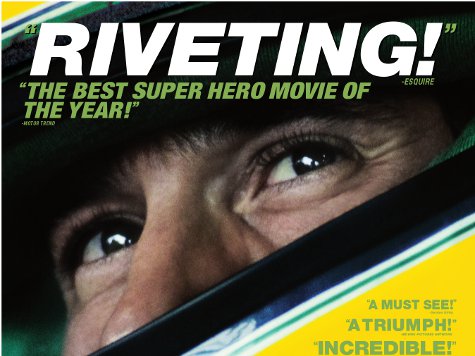May 1, 1994, marked the last time a Formula One driver was killed on the track. That driver, Ayrton Senna, is the subject of a stunning documentary, “Senna,” directed by Asif Kapadia.
While the name Ayrton Senna will likely elicit yawns here in the U.S., Senna was one of the most beloved and storied athletes in the world. At the time of his death, he was already a legend on the F1 circuit and was recently named the greatest F1 driver of all time in a recent poll by current and former F1 drivers. He is as big as Jordan, Ali, Brady, and Ruth.
A speed demon graced by God, Senna had an innate ability, unnatural intensity, and a maniacal focus that drove him to push his car, and himself, to the very limits of their endurance. His mantra “Pure driving, real racing. That’s what makes me happy” reveals the devotion that he brought to the track – not just for races, but even qualifying laps, test drives – any time he was behind the wheel.
What really marks “Senna” as a must-see film is the storytelling. “Senna” transcends genres and plays like a compelling narrative biopic – you need not be an F1 fan to get caught up in the artistry and passion.
Like Bird had Magic and Ali had Foreman, Senna’s arch rival, French racer Alain Proust – a superstar in his own right – plays the role of the politically well-connected and calculating villain. Measured and analytical where Senna is fierce and passionate, Proust serves as the perfect antagonist to Senna’s total dominator of the sport.
“Senna” plays up their intense rivalry and kicks into high gear when the raw talent and ferocious driving style of the younger upstart, Senna, begins to eat away at the domination of the experienced Proust. As the distance between them in the standings diminishes with every passing race, their relationship grows more distant and strained. Each racer will give no quarter, and a once-friendly rivalry turns into an intensely personal blood feud.
The Japanese Grand Prix becomes a figure in this passion play when in consecutive years, with the World Championship on the line for both drivers, they become embattled in a grudge match for F1 supremacy.
The entire arc of the story is displayed in that first year’s “accident.” Anything less than a win by Senna guarantees a World Championship for Proust, who runs Senna off the track near the end of the race. After disentangling their cars, and a quick pit stop to fix his racer, Senna rejoins the race in last place with only five laps to go.
To watch the jaw-dropping mastery with which Senna methodically, maniacally circles the track to ultimately win is to behold the essence of human achievement. It is truly staggering. And, it also makes the ensuing controversy that much more painful.
Frustrated that Senna has prevailed, Proust lodges a formal complaint with the F1 officials, and after much haggling and cries of nepotism (F1’s governing body, FISA, was helmed by fellow Frenchman Jean-Marie Balestre), Senna was ruled ineligible over a trifling technicality, and the World Championship went to Proust.
Such is the political world for which Senna, for all his talent as a driver, had little stomach or ability to navigate. This rebuke from the ruling body of F1 drove Senna into fits of depression. But rather than give in to the “dark side,” Senna redoubled his efforts and came back fueled with more desire than ever.
For all his intensity, one of the most striking aspects of Senna is the sense of calm and ease with which he races –in stark contrast to his speed demon on-track persona.
There is nothing more endearing than a person truly comfortable in their own skin, and one of the most striking elements of the film is how calm and relaxed Senna is before his big races. A devoutly religious Catholic who often read the Bible between races, Senna credits God for his zen-like presence.
At one of his first big races – with chaos, adrenaline, and pressure surrounding the track – the serenity he conveys lets us know here is a man sitting in destiny’s seat. He says, “I think God gave me this chance, which I have been waiting so long. And now He is helping me stay calm, relaxed, tranquil.”
By far, the biggest challenge for viewers of “Senna” is to remain dry eyed at the end. Watching the inevitable demise of Ayrton Senna, even though you know it’s coming, you can’t help but try to will a different outcome.
Driven by a world-class soundtrack by Antonio Pinto (“City of God”) and written by Manish Pandey, “Senna” is an inspiring and audacious film, sure to win many converts to F1, and like the man himself, rightfully deserves the many awards it has stacked on its mantle.
“Senna,” available on Blu-ray July 10, is distributed by ARC Entertainment and is available on Netflix, DVD, and Blu-ray.

COMMENTS
Please let us know if you're having issues with commenting.